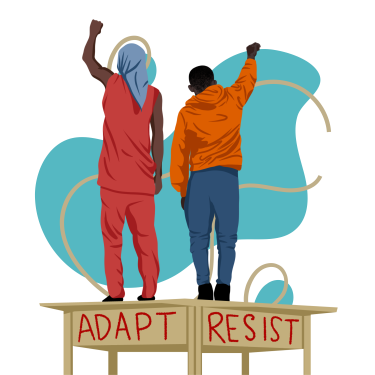
Demand 08
Adaptation & Resilience
Nigeria has developed several policies, strategies, plans and actions to key into the global adaptation goal to enhance adaptive capacity, strengthen resilience and reduce vulnerabilities associated with climate change, despite being the 6th least-ready country on adapting to climate change.²⁷
According to the UNFCCC,²⁸ successful adaptation not only depends on governments but also on the active and sustained engagement of stakeholders, including local communities, national, regional, multilateral and international organisations, public and private sectors, civil society and other relevant actors, as well as effective management of knowledge.²⁹ Thus, the Nigerian government must develop and implement adaptation and resilience strategies that are comprehensive and articulated in a way that recognises the varying needs and vulnerability of all sections of society.
Call to Action
Local and state governments should establish focal points to coordinate and mainstream climate change adaptation into all existing and new development policies, plans and programs.
Implement adaptive social protection mechanisms such as cash transfer programs to scale up responses of poor and vulnerable households to extreme weather events such as floods, and droughts.
Support governments at all levels to ensure that high-vulnerability populations have the financial, technical, and institutional resources they need to adapt to climate change.
Fund research institutions to uncover locally-driven practices to aid climate adaptation efforts while improving locally-led policies that reduce vulnerability and increase the resilience and adaptation capacity of all economic sectors and all people, especially vulnerable groups such as children, women and Persons with Disabilities (PWDs).
Create a seat for young people in the sectoral governance of NAP for Nigeria and constitute an Adaptation Youth working group to strengthen the capacity of young people to champion and support adaptation projects and aid the implementation of national policies - applying gender and social perspectives to the issues.
Initiate measures to channel investment and finance towards, addressing the youth-led adaptation priorities, and losses and damages being witnessed across the country.
Private sectors must transition to green supply chains, logistics, and equipment of real sector companies as well as reduce their waste and energy consumption.
Collaborate with all levels of government to plan and implement a national disaster risk finance strategy to promote proactive disaster risk reduction, climate change adaptation, and timely and fiscally prudent recovery from climate-related disasters.
References
[27] https://www.climatepolicyinitiative.org/publication/landscape-of-climate-finance-in-nigeria/
[28] https://unfccc.int/sites/default/files/resource/Nigeria-Adaptation-Communication-UNFCCC-2.pdf
[29] https://unfccc.int/sites/default/files/resource/Nigeria-Adaptation-Communication-UNFCCC-2.pdf